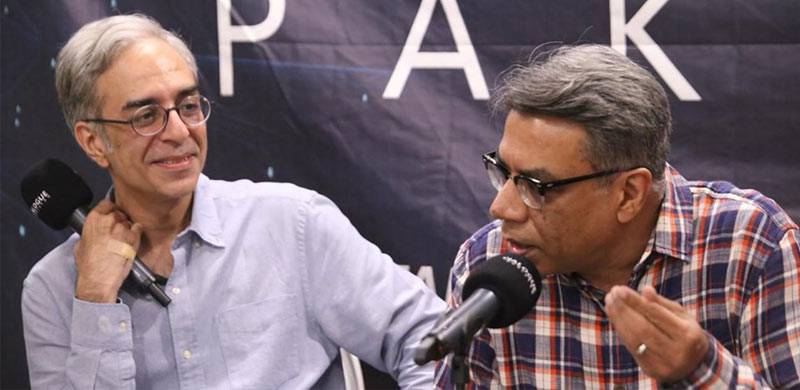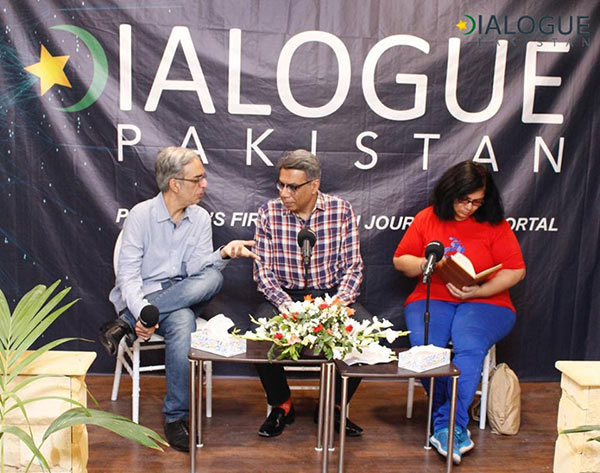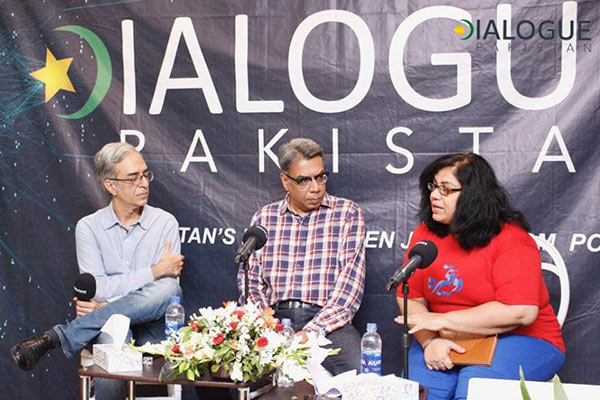
KARACHI: Edward House is home to Pakistan’s first citizen journalism platform, Dialogue Pakistan. The said platform in one of their initiatives hosted a panel discussion with seasoned journalists. The discussion titled ‘Room for Objective Journalism in Subjective Media’ was moderated by Nadeem Farooq Paracha, an author, cultural critic, and columnist at Naya Daur. The guests included Zarrar Khuhro, another seasoned journalist with ample experience in both print and broadcast journalism, currently associated with Dawn News. The third guest of the evening was Shazia Hasan, again an award-winning reporter.
The discussion kicked off with Nadeem Farooq Paracha presenting a background context to determine the scope of the discussion. He reflected on the transition from conventional to modern-day journalism. In his introduction, he mentioned the 'Fox News Model" and how networks around the world resorted to the same.

Paracha went on to explain the changing nature of media where the intent to remain 'objective' was bad for business or financially not sustainable anymore as one would say. His introduction mentioned the normalization of rather extreme opinions or opinions which may be dressed as facts.
To build the ground for further discussion, Paracha cited examples from modern-day media where one may claim that 'nine-eleven was an inside job'. In the same manner, one can attribute someone with terms as fascist, racist, sexist etc.
Paracha asked Zarrar Khuhro about the endorsement of subjective journalism by Pakistani media in particular. Khuhro started with the definition of Truth explaining how "truth has become a matter of opinion and if it is endorsed by enough people around the world, it might as well become an accepted fact”.
While referring to the current scenario and difficulties faced by Pakistani media Khuhro cited examples of censorship where no one admits to the said censorship. His examples included recent interviews of Hamid Mir and Nadeem Malik, which were taken off-air amid ‘technical’ or ‘legal’ issues.
Khuhro went on to explain that the impact of censorship might be irrelevant. "To an extent what is happening here is a reflection of what's happening around the world". Khuhro cited examples from Indian media with the likes of Arnab Goswami. "They do not care about the truth, in fact, and they have developed their own truth", Khuhro added.
The moderator turned to Shazia Hasan where he asked Hasan about her interest in Human stories and her association with Dawn. Despite the level of effort and originality in your stories, other stories with sensationalism might gain traction, Paracha added while addressing Hasan.

"There are times when I feel a little bit frustrated, Shazia Hassan replied", she went on to explain her career as a creative writer and the level of objectivity in her stories.
Hasan while referring to her experience as a reporter quoted an example of a school in Karachi, situated in a rather under-privileged area of the city. The said school has almost been demolished.
"I was invited by the old boys of a school which under the radar of land mafia, currently involved in a court case, was sealed". According to Hasan, there was a session where all relevant stakeholders were invited including parents and teachers; she explained how important the said school was to the people of the area.
Hasan told how she asked the parents to break the seal off and reclaim their school; it was one particular experience of journalistic activism for Hasan.
Hasan went on to quote another incident where she covered the family of Saulat Mirza who was sentenced to death. Hasan covered Mirza’s family after his body was transferred to Karachi. She explained how her story developed as she 'kept an open mind' pertaining to Mirza’s story and the factors leading up to his death sentence.
Paracha, continuing the discussion started about the rivalry between contemporaries in the media industry, said that if one particular network is under the radar, the others (media networks) celebrate.
Khuhro agreed with Paracha on the polarization and division in the industry. "This is the kind of world we live in, money rules and polarization works", Khuhro added. He explained how censorship works from within when it comes to financial interests and advertisement revenues.
He went on to explain the modern-day dynamics where if we move beyond tribes, we have a tribe of our own, we move beyond religion and then atheism is a new religion.
The panel agreed to the fact that the difficulties media might be going through is not only due to external constraints, rather were very much due to internal reasons. Whether or not there is room for objective journalism in the modern-day world remains an open-ended question, organizations, which are true to journalistic ethos, are struggling. Paracha mentioned The New York Times, The Guardian or Dawn for that matter.
Journalism students, working journalists and members privy to the media industry, attended the session in question.
The discussion kicked off with Nadeem Farooq Paracha presenting a background context to determine the scope of the discussion. He reflected on the transition from conventional to modern-day journalism. In his introduction, he mentioned the 'Fox News Model" and how networks around the world resorted to the same.

Paracha went on to explain the changing nature of media where the intent to remain 'objective' was bad for business or financially not sustainable anymore as one would say. His introduction mentioned the normalization of rather extreme opinions or opinions which may be dressed as facts.
To build the ground for further discussion, Paracha cited examples from modern-day media where one may claim that 'nine-eleven was an inside job'. In the same manner, one can attribute someone with terms as fascist, racist, sexist etc.
Paracha asked Zarrar Khuhro about the endorsement of subjective journalism by Pakistani media in particular. Khuhro started with the definition of Truth explaining how "truth has become a matter of opinion and if it is endorsed by enough people around the world, it might as well become an accepted fact”.
While referring to the current scenario and difficulties faced by Pakistani media Khuhro cited examples of censorship where no one admits to the said censorship. His examples included recent interviews of Hamid Mir and Nadeem Malik, which were taken off-air amid ‘technical’ or ‘legal’ issues.
Khuhro went on to explain that the impact of censorship might be irrelevant. "To an extent what is happening here is a reflection of what's happening around the world". Khuhro cited examples from Indian media with the likes of Arnab Goswami. "They do not care about the truth, in fact, and they have developed their own truth", Khuhro added.
The moderator turned to Shazia Hasan where he asked Hasan about her interest in Human stories and her association with Dawn. Despite the level of effort and originality in your stories, other stories with sensationalism might gain traction, Paracha added while addressing Hasan.

"There are times when I feel a little bit frustrated, Shazia Hassan replied", she went on to explain her career as a creative writer and the level of objectivity in her stories.
Hasan while referring to her experience as a reporter quoted an example of a school in Karachi, situated in a rather under-privileged area of the city. The said school has almost been demolished.
"I was invited by the old boys of a school which under the radar of land mafia, currently involved in a court case, was sealed". According to Hasan, there was a session where all relevant stakeholders were invited including parents and teachers; she explained how important the said school was to the people of the area.
Hasan told how she asked the parents to break the seal off and reclaim their school; it was one particular experience of journalistic activism for Hasan.
Hasan went on to quote another incident where she covered the family of Saulat Mirza who was sentenced to death. Hasan covered Mirza’s family after his body was transferred to Karachi. She explained how her story developed as she 'kept an open mind' pertaining to Mirza’s story and the factors leading up to his death sentence.
Paracha, continuing the discussion started about the rivalry between contemporaries in the media industry, said that if one particular network is under the radar, the others (media networks) celebrate.
Khuhro agreed with Paracha on the polarization and division in the industry. "This is the kind of world we live in, money rules and polarization works", Khuhro added. He explained how censorship works from within when it comes to financial interests and advertisement revenues.
He went on to explain the modern-day dynamics where if we move beyond tribes, we have a tribe of our own, we move beyond religion and then atheism is a new religion.
The panel agreed to the fact that the difficulties media might be going through is not only due to external constraints, rather were very much due to internal reasons. Whether or not there is room for objective journalism in the modern-day world remains an open-ended question, organizations, which are true to journalistic ethos, are struggling. Paracha mentioned The New York Times, The Guardian or Dawn for that matter.
Journalism students, working journalists and members privy to the media industry, attended the session in question.
